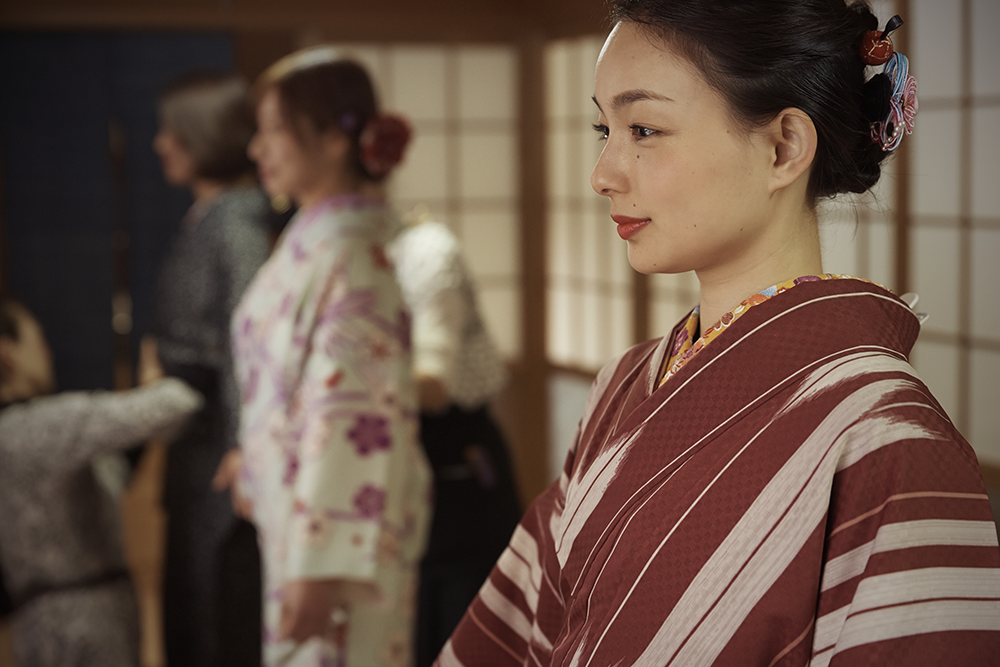Today's Point
今日のポイントまた同じ意味で、[〈What+a/an+名詞〉+〈S+V〉!]の形もあります。例えば、What a day (it was)!「なんて日だったのでしょう!」のようになります。

てんぷらは、ポルトガルのフリッターを日本風にアレンジした料理だと説明するケン。
意外と博識なんですね。
ちなみに、てんぷらは鉄砲伝来と同じくらいの時期にポルトガルから日本に伝わったと言われています。ケン、それは知ってた?
さて、ジョーが「なんておもしろい料理なんでしょう」と言う、ケンが大好きな日本料理はなんと…。

Story of the Day
今日のストーリーRepeat after your teacher.
先生の後に続けて言ってみましょう。
| Jiu : Jyo is also interested in Japanese food. | ジウ : ジョーは和食にも興味があるのよ。 |
|---|---|
| Ken : Really? What’s your favorite dish? | ケン : ほんと?好きな料理は何? |
| Jyo : I love tempura. | ジョー : てんぷらが大好き。 |
| Ken : Me too. | ケン : ぼくもだ。 |
| Ken : Did you know tempura was originally a Portuguese dish? | ケン : てんぷらは元々ポルトガル料理だったって知ってた? |
| Ken : It’s the Japanese version of Portuguese fritters. | ケン : ポルトガルのフリッターの日本版なんだ。 |
| Jyo : Really? That’s fascinating! | ジョー : ほんと?おもしろい話ね。 |
| Jyo : So, what’s your favorite dish? | ジョー : それで、あなたの好きな料理は? |
| Ken : My favorite dish is tamago kake gohan. | ケン : ぼくは卵かけご飯が好きなんだ。 |
| Jyo : What is that? | ジョー : 何それ? |
| Ken : It’s just plain white rice topped with raw egg and soy sauce. | ケン : 普通の白いご飯に生卵と醤油をかけるだけなんだ。 |
| Ken : So simple, yet so delicious. | ケン : ものすごく簡単でものすごく美味しいんだ。 |
| Jyo : What an interesting dish! | ジョー : なんておもしろい料理! |
| Jyo : You should make it for me sometime! | ジョー : いつか作ってね! |
| Ken : Sure! | ケン : もちろん! |
| Jiu : Hello? I’m still here. | ジウ : もしもし、わたしがいること忘れてない? |
Key Phrase
キーフレーズRepeat after your teacher.
先生の後に続けて言ってみましょう。
What an interesting dish!
Vocabulary / Expressions
ボキャブラリーと表現Repeat after your teacher.
先生の後に続けて言ってみましょう。
| originally (副詞) | 元は |
|---|---|
| fritters (名詞) | 衣をつけた揚げ物 |
| fascinating (形容詞) | 魅惑的な |
| plain (形容詞) | 普通の |
| raw (形容詞) | 生の |
Exercise
エクササイズ ARead the conversation aloud with your teacher. Fill in the blanks with a, b and c.
After that, fill in the blanks with your own words and practice the conversation with your teacher.
下記の会話の空欄に、a, b, cそれぞれの言葉を入れて、先生と一緒に音読してみましょう。
そのあと、空欄に入る言葉を自分で考えて、先生と会話をしてみましょう。

| Ken : Did you know tempura was originally a Portuguese dish? | ケン : てんぷらは元々ポルトガル料理だったって知ってた? |
|---|---|
| Jyo : Really? That’s ________ (a. interesting b. good to know c. something new to me). | ジョー : ほんと?それは(a. 面白いわね b. 良いこと聞いたわ c. 知らなかったわ)。 |
| Jyo : So, what’s your favorite dish? | ジョー : それで、あなたの好きな料理は? |
| Ken : My favorite dish is tamago kake gohan. | ケン : ぼくは卵かけご飯が好きなんだ。 |
| Jyo : What is that? | ジョー :何それ? |
| Ken : It’s just plain white rice topped with raw egg and soy sauce. | ケン : 普通の白いご飯に生卵と醤油をかけるだけなんだ。 |
| Jyo : What ________ (a. a recipe b. an easy dish c. an awesome meal)! | ジョー : なんて(a. (すごい)レシピなの b. 簡単な料理なの c. 素晴らしい料理なの)! |
Exercise
エクササイズ B (Vocabulary Building)Choose the correct word from the box.
空欄に当てはまる言葉を選んで文章を完成させてください。
- originally
- fritters
- fascinating
- plain
- raw
- I'm going to have some ________ and a milkshake.
- I am ________ from Sendai.
- Mix the soap with some ________ water.
- This is a ________ story!
- I don't want to eat ________ meat.
Exercise
エクササイズ CSituation : You are watching your friend try on Kimono. Make some comments about the design of the kimono.
ロールプレイ : 友人が着物を着てみようとしています。それを見てその着物のデザインについてコメントしてください。


Extra Exercise
Try the Extra Exercises. As with Exercise A, become familiar with some of these more advanced phrases.
エクストラ・エクササイズに挑戦してみましょう。
エクササイズAと同じ要領で、より高度なフレーズを練習してみましょう。
What an interesting dish!
| Jose: I’m so tired. |
|---|
| Ken: Me too. |
| Ken: What a (a. complicated project we have b. tough couple of days we’ve had c. difficult client we have to deal with). |
| Jose: Are you staying overtime? |
| Ken: It looks like it. |
| Ken: I’m determined to finish this tonight. |
| Jose: What a (a. strong work ethic you have b. reliable teammate I have c. hard worker you are). |

- a couple of~は、 a pair of ~と同じで「2つの~」「2人の~」という意味ですが、a small number of ~「少数の~」、 a few ~「2、3の~」という意味もあります。文脈でどちらの意味なのかを判断しましょう。
- stay overtimeはwork overtimeに書き換えることができます。overtimeは「超過勤務の」「時間外の」という意味の副詞。従って、いずれも「残業する」という意味です。
- work ethicは「労働倫理」、reliable「頼りになる」。